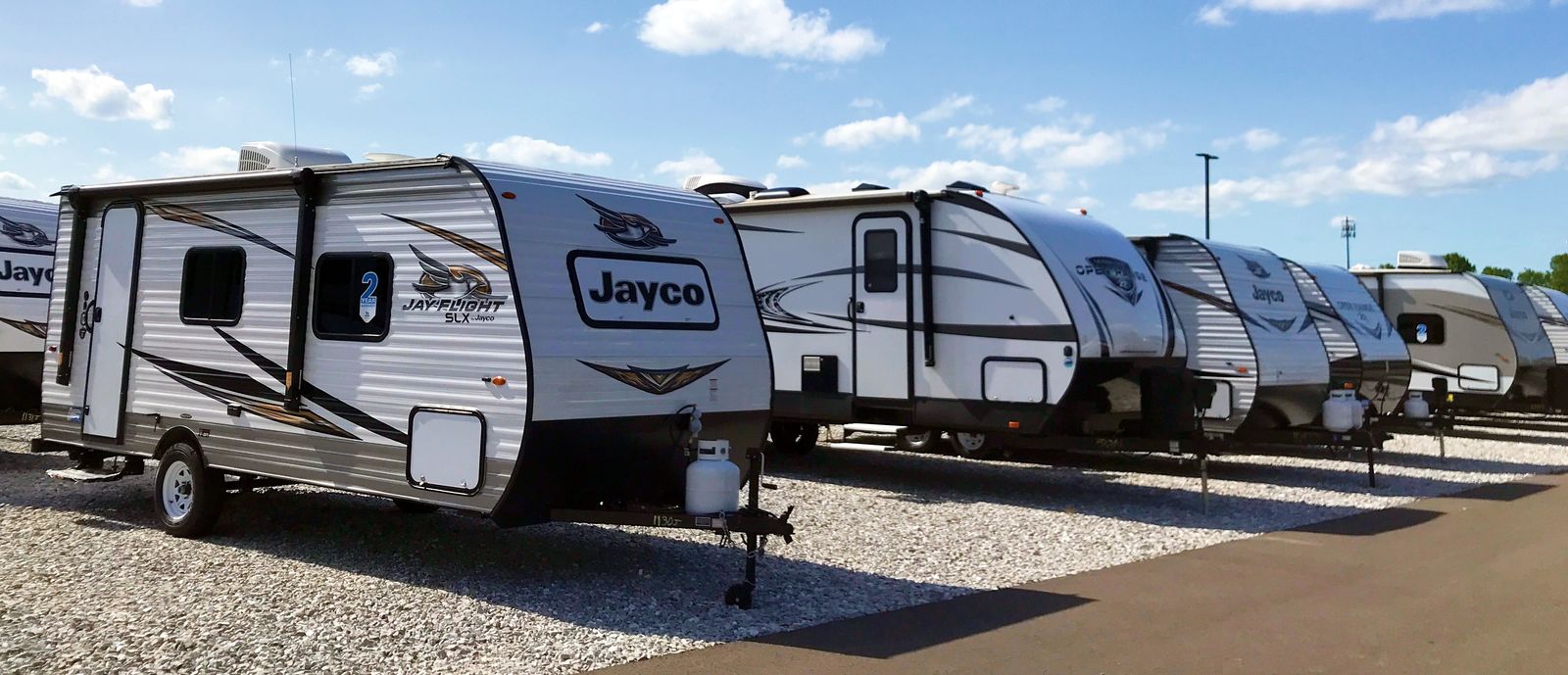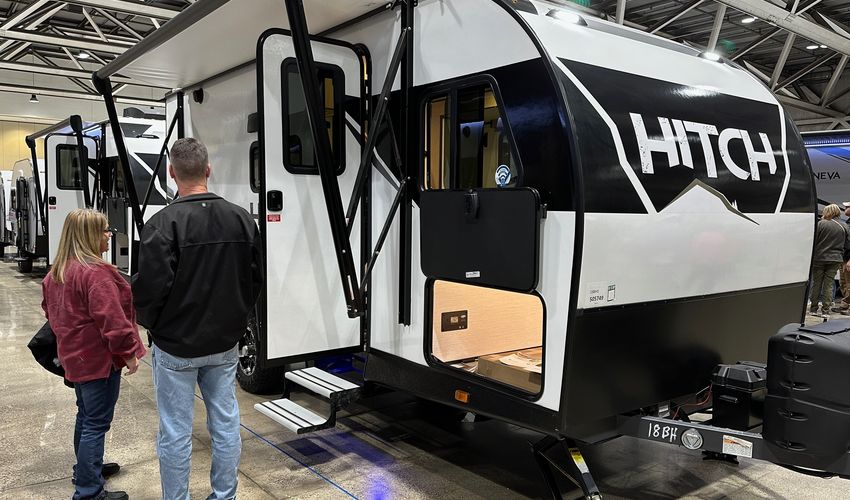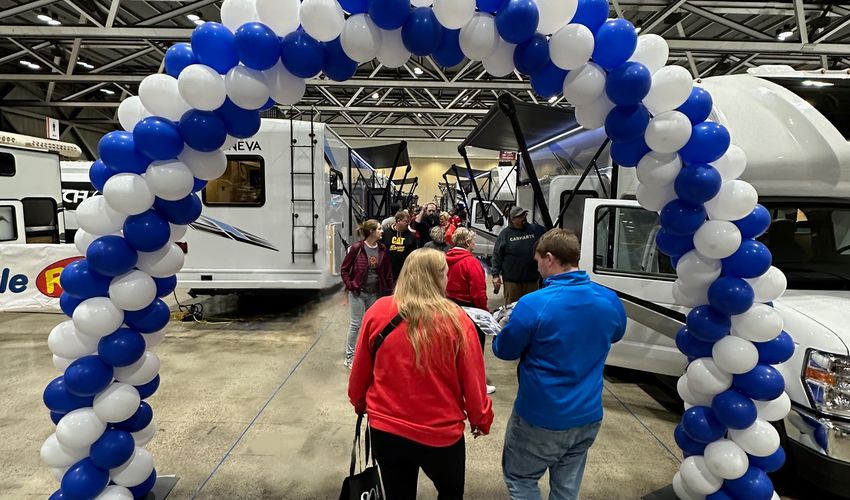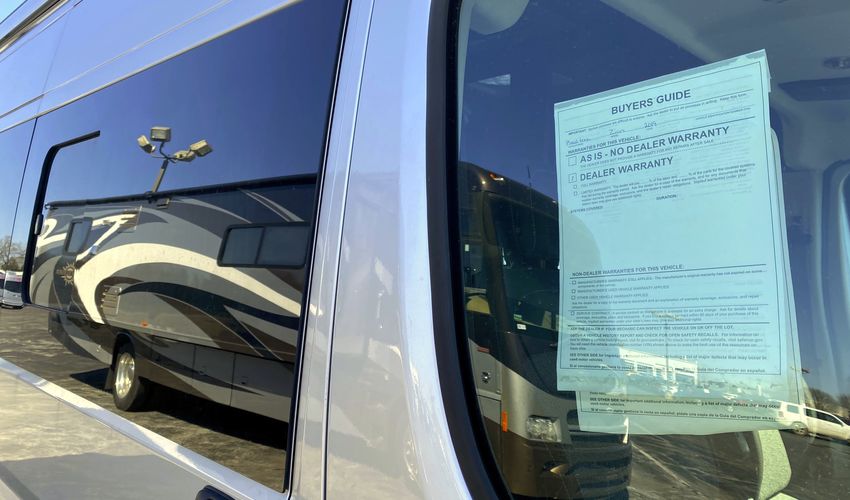Chances are, you may have purchased a few cars in your lifetime, and you may expect the RV-buying process to be the same. While these two major purchases share some similarities, the process of buying an RV has unique aspects and steps to consider before taking the leap. Explore where to shop, what to expect when financing an RV, and which extra items you may want or need to purchase for your new vehicle.

The RV Purchase Process
Whether you are purchasing your first RV or upgrading to a new one, learning about the RV-buying process can ensure you find an RV that fits your lifestyle and budget.

Decide Where to Shop for an RV
You may have dozens of car dealerships, representing every major brand, within a short drive from your house. However, this is usually not the case with RV dealerships, which may be spread out far and wide. You might find what you want at a local RV dealership, or you may need to drive a few hours to a non-local dealer to find the RV of your choice. You also could shop at an RV show, which brings many brands and dealers together in one location over the course of a long weekend. While these are all good options, here are some important elements to consider when deciding where you should shop for your new RV:
- Purchasing From a Local Dealer: A local dealership is not only convenient for shopping–it is also convenient for the return trip for your RV walkthrough (where you do a point-by-point inspection and learn how to operate your new rig). Plus, it makes it easier to take your rig to the dealership for any warranty work or maintenance. Keep in mind, a local dealer may not have your dream RV or a preferred brand. Most dealerships specialize in a small number of manufacturers.
- Purchasing From a Non-Local Dealer: Looking at non-local dealerships greatly expands your RV brand options. If your local dealer doesn’t carry your favorite manufacturer, don’t despair. Just get ready to drive farther to find it. Expanding the reach of your search may also increase your bargaining power during the price negotiating process. A non-local dealer, however, may not be convenient for warranty work or maintenance after the sale, so plan on finding a closer location for follow up service.
- Purchasing at an RV Show: Many shows have a carnival-like atmosphere, making for a fun shopping experience. Shoppers are able to explore many brands and floorplans all in one place without driving to multiple places. Also, you may find exceptional prices because of the competition. If you are not a big fan of heavy negotiating, but still want a great price, an RV show may hit the sweet spot for you. You won’t be able to leave with your new RV that day, though. You’ll need to drive to the dealer for your RV walkthrough at a later date.

Understand RV Financing
After you find the RV of your dreams, your next step is to consider financing, unless you have cash on hand. Have you ever walked in a car dealership and left a few hours later with a new car and a new loan at a great rate? While it is sometimes possible to do this with RVs, the financing process has some differences. Here are the main elements to anticipate:
- Lenders: Not all lenders offer RV loans, and some may have more limited terms. Most dealerships offer financing (often through outside lenders). National banks and RV-specific financers may be accessed online.
- Interest rates: Expect interest rates to be higher on RVs than cars since they are considered a luxury product. You may need to shop around more to get your best rate. Check with your credit union and bank or look online for major institutions that finance RVs. Allow up to a few days for loan approval.
- Loan terms: While it is common for cars to be financed for 36 to 72 months, you may be able to finance your RV for as many as 120 to 240 months, depending on the price and type of rig. Expect shorter terms for travel trailers and longer terms for fifth wheels and motorhomes.
- Down payment: Depending on your lender, you may be required to put down a down payment of as much as 20 percent. This will vary greatly based on lender, type of rig, and your creditworthiness.

Expect the Extras When Buying an RV
When buying an RV, you may have some extra expenses and time considerations. Keep these in mind:
- Insurance: Protecting your new RV purchase with insurance is highly recommended. You may get this from the same company as your home or automobile insurance—or you may want to consider other suppliers who offer more specialized RV coverage.
- Warranties: Even the simplest RVs may come with plumbing, appliances, heating and cooling systems, and more—and that’s all on top of the interior and exterior structure. When buying a motorhome, you now own another engine. As with insurance, warranties can help protect your purchase. New RVs will come with initial warranties, and some buyers buy extensions or coverage for certain elements (like tires). Research can go a long way before you are sitting across a table and making decisions during the negotiation process.
- Safety gear: Usually, you can’t drive your new RV off the dealership lot without some special safety gear like tow bars and stabilizing hitches. Research these elements beforehand, so you can be prepared or buy what you need onsite (just make sure the service center is available to help with setup, if needed).
- RV inspection and walkthrough: This final extra element comes at no cost, other than your time. After an RV purchase, the dealer often needs time to properly clean and prep your rig. Depending on availability, you may need to return on a different day to finalize your purchase, complete the point-by-point inspection, and do a walkthrough to learn how to operate everything. Pay close attention to all the moving parts so you can document any necessary repairs. Then, record each step of the walkthrough on your smartphone (or take copious notes). You’ll be thankful when it’s time to light your stove, winterize your system, or empty your tanks for the first time.

When shopping for an RV, it's important to consider where to make your purchase, whether from a local dealer for convenience, a non-local dealer for expanded options, or an RV show for competitive pricing.
Additionally, understanding RV financing nuances such as interest rates, loan terms, and down payments is essential before committing to your dream RV.
Finally, don't forget about the extra expenses and time commitments, including insurance, warranties, safety gear, and the RV inspection and walkthrough, which are all part of the RV buying process. And don’t worry–navigating these unique aspects of the RV buying experience will get you that much closer to those amazing RV adventures.






